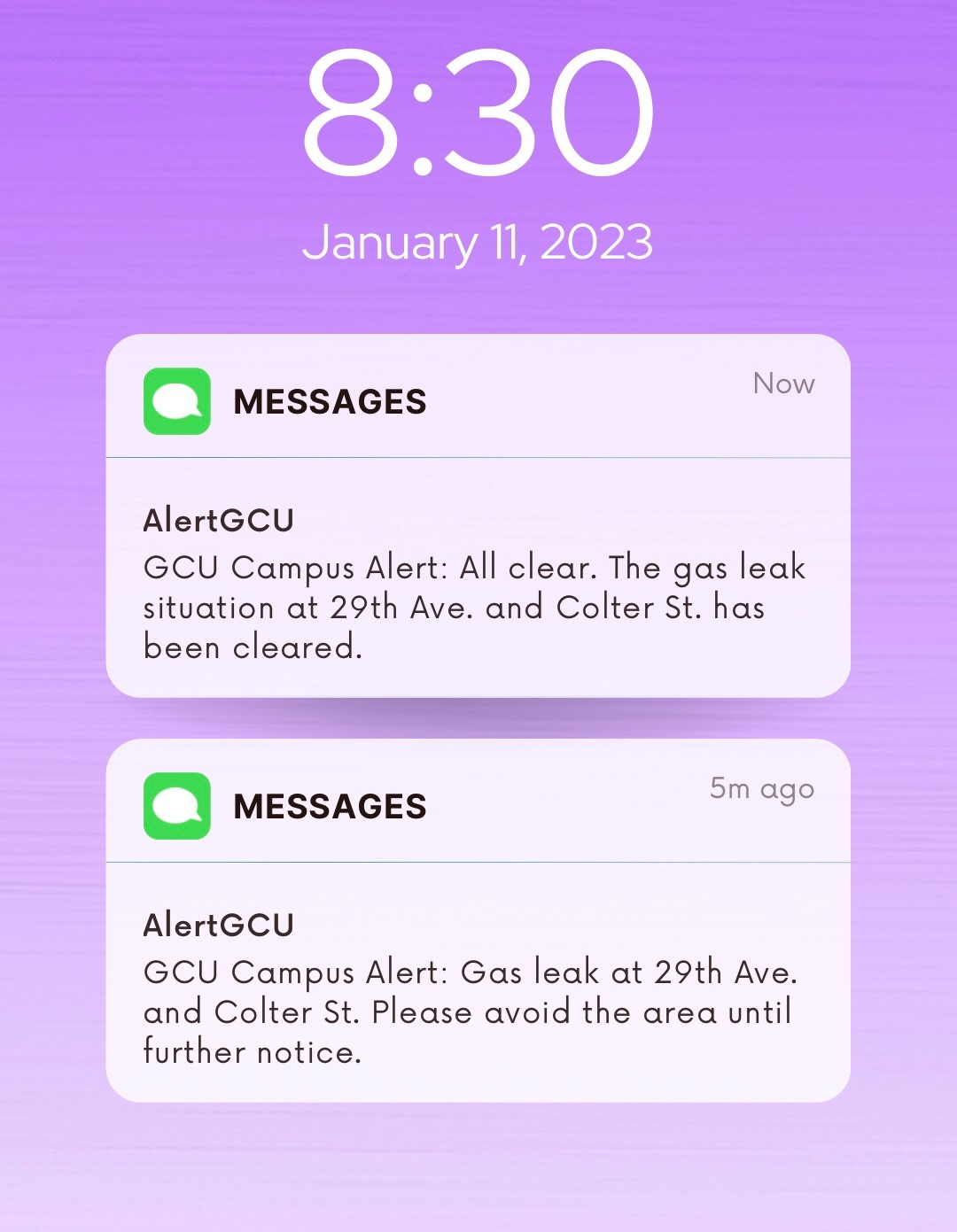Active Threat Preparedness
GCU’s campus remains very safe due to the many Public Safety safeguards we have in place. Yet, as we have seen on other college campuses, indiscriminate acts of violence can occur anywhere. To ensure we are prepared in the unlikely event of an active threat situation, it is important to know how to identify and react in such a scenario.
How you can prepare for an active threat
• Ensure you are signed up to receive emergency alerts and notifications by making sure your phone number is updated
• Add the GCU Police Department to your phone contacts, 602-639-8100
• Know the building, classroom or office name and numbers you are in
• Know where the nearest exit is
• Know how and who is responsible for locking exterior doors
• Know your building’s emergency assembly area and process for accountability
• If you work in an open space or are constantly on the move, identify potential hiding spaces
• Know how to report anything or anyone that is suspicious to GCU Public Safety (TIPS)
If an active threat does occur
In the event that there is an imminent and ongoing threat to campus safety, an AlertGCU will be issued. It is important you understand the terminology that might be used in those alerts.
RUN, HIDE, FIGHT
RUN
• Find a clear and safe path
• Evacuate the building or area, even if others will not follow
• Leave all your belongings behind, don’t let your items slow you down
• Help others escape, if possible
• Don’t stop, keep running away from the threat and find a safe place to HIDE
HIDE
• HIDE if there is no safe exit or if the exit is blocked by the threat
• Lock doors and windows and if possible, move farther into the building or room
• Silence cell phones, turn off the lights, block the door with any items and hide behind furniture
• Prepare a team FIGHT plan
FIGHT
• As a last resort, when running and hiding are not an option, fight when your life is in imminent danger.
• Don’t fight fair
• Use all objects as a weapon
• Use teamwork and surprise on the attacker: a coordinated ambush can incapacitate an attacker
• Remember you are fighting for your life
Lockdown
If you are not in the area where the threat has been identified, you will need to follow Lockdown procedures. Lockdown means staying away from the threat and continuing to be aware of your surroundings.
If you are outside:
• Find the safest path to move quickly away from the incident or threat
• Find a building to enter and wait for further instructions
• Instruct others to follow
• If necessary, leave any personal belongings
• Once inside, follow the inside instructions
If you are inside:
• If the threat is reported on another part of campus, stay where you are.
• Lock doors, silence cell phones, and be prepared to HIDE
• If you are on the first floor, make sure to lock the exterior doors (assign the responsibility) and move farther into the building
• If you cannot lock doors and it is safe to do so, quickly move to another room or area with the ability to lock doors
• Monitor for any threats
• Be patient and wait for Public Safety updates/All Clear communications via AlertGCU
What should I tell the 911 operator when calling?
• Tell them you are on the campus of Grand Canyon University.
• Be specific about the location where the incident is occurring. (e.g., “There is an active shooter on the campus of Grand Canyon University, inside Canyon Activity Center, building 58.”)
• Provide a specific description of those involved, including clothing and weapons.
• Don’t assume someone else is calling 911. If you have specific information and have made it out safely, call the police.
What should I expect when police officers arrive?
• Remain calm and be prepared to show your hands to arriving police officers.
• Do not slow down responding officers, follow their instructions and keep moving. Do advise them where the suspects may be in the building.
Emergency alerts and notifications through AlertGCU
• GCU is committed to implementing multiple technologies for emergency alerts and notifications, including outdoor warning sirens, SMS text, email, desktop and display sign messages, and posting to social media and emergency.gcu.edu
• All students are automatically subscribed to the AlertGCU notification system upon enrollment and faculty/staff are automatically subscribed upon employment. Students can update their contact information through the Student Portal or by contacting their Student Services Advisor. Faculty and staff can update their contact information through Workday
• Recognize how you receive emergency alerts and notification
• Participate in emergency preparedness tests and drills
• Emergency alerts and notifications are issued based on the level of threat and location on or around campus

Emergency Preparedness Training
Every division, department, program, residence hall and student organization at GCU is encouraged to receive training on emergency action plans (EAP). Please contact [email protected] to schedule EAP training.
